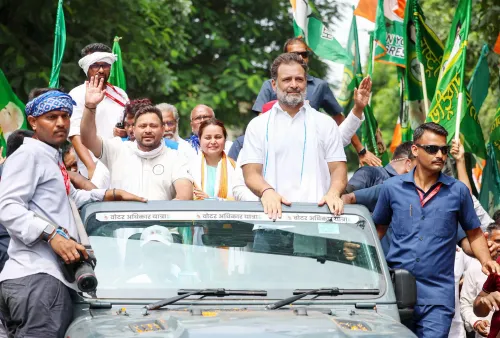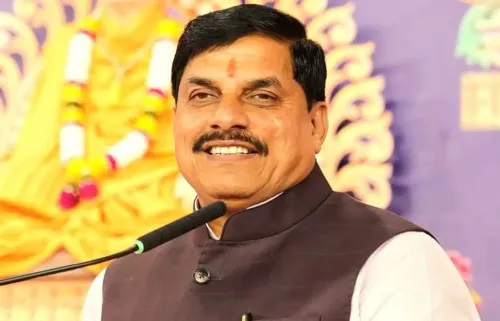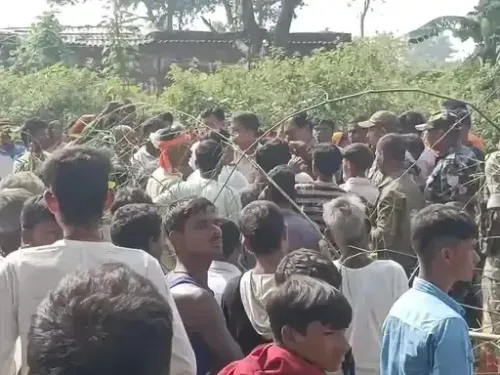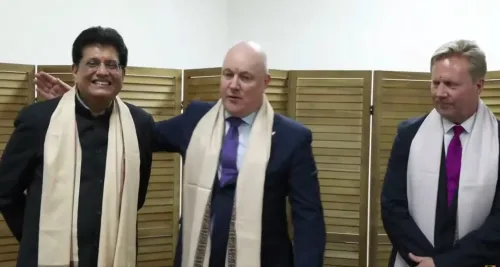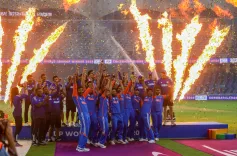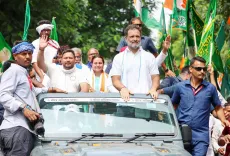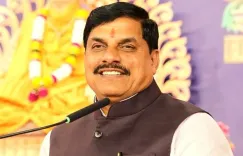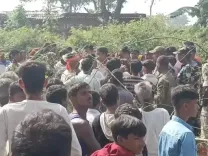Pujari Granthi Samman Yojana: A Political Ploy or Genuine Support? Insights from Marghat Wale Baba Temple Priest (IANS Interview)
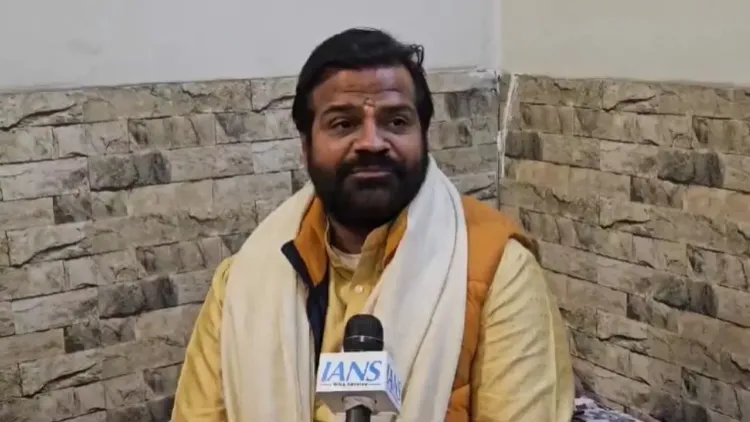
New Delhi, Jan 7 (NationPress) Former Delhi Chief Minister Arvind Kejriwal has recently inaugurated the Pujari Granthi Samman Yojana, a program designed to offer a monthly remuneration of Rs 18,000 to priests and granthis in Delhi. Pandit Vaibhav Sharma, a priest at the Marghat Wale Baba temple, has voiced his skepticism regarding the authenticity of this initiative, describing it as merely a political gesture and questioning its practicality.
Sharma's remarks followed the announcement of the upcoming election dates by the Election Commission of India.
In an exclusive conversation with IANS, Pandit Sharma expressed apprehensions about the credibility of the Pujari Granthi Samman Yojana, suggesting it serves as an electoral tactic aimed at securing votes. He also pointed to allegations of corruption against Kejriwal, implying that this scheme might be exploited for political advantage.
Here’s an excerpt from the interview:
IANS: Recently, Arvind Kejriwal visited you to facilitate registration for the Pujari Granthi Samman Yojana, promising Rs 18,000 as monthly compensation. What’s your perspective on this declaration?
Pandit Vaibhav Sharma: We had no prior notice of his visit; we were only informed five minutes before he arrived. As part of our religious duty, we welcome all visitors to the temple. After his visit and some refreshments, Kejriwal presented a registration booklet. When asked if we would register, we felt we had no option but to agree. He directed us to include the numbers of all sevadars. Although we registered for 12, we were aware that only two of us were present. Once registration concluded, the media began inquiring, but we were left without answers. This feels like yet another election promise; Rs 18,000 seems impractical, and previous similar promises have gone unfulfilled. We’ve seen comparable promises, such as Rs 2,100 or Rs 2,500 for priests in Punjab, yet none materialized. Claims of one lakh registrations are dubious; the question remains whether funds will actually be disbursed. It appears more like a photo op.
IANS: Kejriwal has been providing Rs 18,000 to Maulvis in Delhi for several years. Do you perceive this announcement as election-driven?
Pandit Vaibhav Sharma: Absolutely, it appears to be an electoral promise. Why was this not disclosed earlier? Why now, just before elections? If Rs 18,000 was intended for the last three years, why is it only being addressed now? It seems like a last-minute strategy to attract votes.
IANS: Considering that Maulvis have been receiving this honorarium for years, shouldn't priests and granthis have also been compensated during this period?
Pandit Vaibhav Sharma: If priests were to receive payment, it would be significant, yet it seems unlikely. We heard that Maulvis protested for delayed payments. If funds were genuinely allocated for them, protests wouldn’t have occurred. Temple priests’ welfare is typically overseen by temple committees. If a committee falters, government intervention is warranted. Still, to my knowledge, no other temple in Delhi has registered priests for this scheme—at least, we have not seen or heard of any such actions in the media. The registration process lacks clarity and transparency, leading us to wonder if it was merely a publicity stunt.
IANS: The Comptroller and Auditor General (CAG) report recently criticized the Sheesh Mahal project. Do you believe Kejriwal’s government is corrupt?
Pandit Vaibhav Sharma: That is a matter for the court to resolve. Nevertheless, we cannot overlook the facts—how many times has he faced jail and obtained bail? The Sheesh Mahal issue is under investigation due to significant public funds involved. For example, the cost of installing a toilet by a major company was exorbitantly high when it could have been accomplished at a fraction of that price. If public funds are mismanaged in this manner, it is indeed regrettable. If a toilet meant to cost Rs 4,000 was instead charged at Rs 4 lakh, it raises substantial concerns. This is just one example. If Kejriwal is making promises totaling crores, like the Rs 18,000 stipend for priests, while the Delhi government faces a budget deficit, one must question the source of this funding. The Jal Board is operating at a loss, disputes abound regarding electricity bills, and various government services are in chaos. Hence, I harbor significant doubts about the viability of these pledges.
IANS: Do you consider Kejriwal’s recent declarations a misuse of public funds?
Pandit Vaibhav Sharma: If these announcements are made with integrity and the funds are managed appropriately, they could indeed benefit the public. Every developed nation offers essential services such as healthcare and transportation. However, the challenge lies in implementation. If the government were more transparent and effective, public criticism would diminish. We pay taxes and expect fundamental services in return—such as well-maintained roads, medical facilities, and utilities. Citizens prioritize basic needs over extravagant projects in hospitals. I personally contribute around Rs 1 lakh in taxes annually, and all I desire in return is competent governance that delivers basic services.
IANS: Arvind Kejriwal portrays himself as an honest individual. What’s your viewpoint on this?
Pandit Vaibhav Sharma: Self-proclamations are irrelevant. What truly matters is public perception. The judgment belongs to the people. I might claim to be exceptional, but if the public disagrees, it holds no value. Similarly, whether Kejriwal asserts his honesty, the people ultimately evaluate his actions to determine whether he is genuinely honest or corrupt.
IANS: Who do you have more faith in—Arvind Kejriwal or Prime Minister Narendra Modi?
Pandit Vaibhav Sharma: I place my trust in Prime Minister Modi. We have endured decades of hardship, particularly in Delhi, prior to Modi's arrival in power. He has unified the nation, transcending caste and regional divides. Under PM Modi’s guidance, we’ve witnessed the realization of the Ram Mandir. While we may encounter challenges like increasing fuel prices, we support PM Modi because we believe in his vision for the nation. It's not merely about minor issues like fuel prices; it encompasses a broader perspective. We voted for PM Modi due to his commitment to safeguarding our culture and religion.
IANS: Kejriwal's adversaries label him as cunning. What are your thoughts?
Pandit Vaibhav Sharma: That’s a question for his opponents. They know him best. Those who have collaborated with him will have their insights, placing them in the most appropriate position to assess his character.
IANS: Do you believe Kejriwal is manipulating priests for electoral gain? Why has he only acknowledged priests now?
Pandit Vaibhav Sharma: Without a doubt, it appears to be electoral maneuvering. For the past three years, Maulvis have received payments, but why were priests overlooked until now? Why the sudden attention? It’s apparent that Kejriwal is responding to the political climate, especially with the rise of Hindu solidarity. PM Modi has unified Hindus across caste distinctions, which seems to pressure Kejriwal to engage with the Hindu community. But if this was a genuine concern, why wasn’t it addressed three years ago? It feels like a reaction to political pressure. Better late than never, yet I remain doubtful about the fulfillment of this promise.

